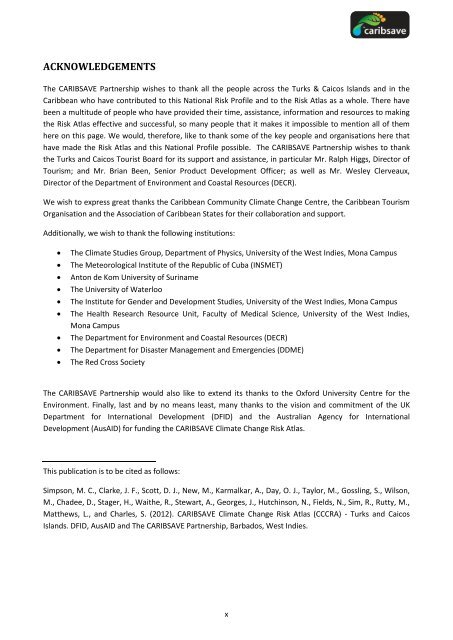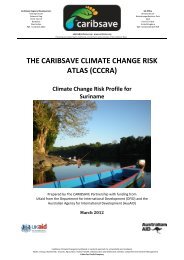Create successful ePaper yourself
Turn your PDF publications into a flip-book with our unique Google optimized e-Paper software.
ACKNOWLEDGEMENTS<br />
The CARIBSAVE Partnership wishes to thank all the people across the <strong>Turks</strong> & <strong>Caicos</strong> Isl<strong>and</strong>s <strong>and</strong> in the<br />
Caribbean who have contributed to this National Risk Profile <strong>and</strong> to the Risk Atlas as a whole. There have<br />
been a multitude of people who have provided their time, assistance, information <strong>and</strong> resources to making<br />
the Risk Atlas effective <strong>and</strong> successful, so many people that it makes it impossible to mention all of them<br />
here on this page. We would, therefore, like to thank some of the key people <strong>and</strong> organisations here that<br />
have made the Risk Atlas <strong>and</strong> this National Profile possible. The CARIBSAVE Partnership wishes to thank<br />
the <strong>Turks</strong> <strong>and</strong> <strong>Caicos</strong> Tourist Board for its support <strong>and</strong> assistance, in particular Mr. Ralph Higgs, Director of<br />
Tourism; <strong>and</strong> Mr. Brian Been, Senior Product Development Officer; as well as Mr. Wesley Clerveaux,<br />
Director of the Department of Environment <strong>and</strong> Coastal Resources (DECR).<br />
We wish to express great thanks the Caribbean Community Climate Change Centre, the Caribbean Tourism<br />
Organisation <strong>and</strong> the Association of Caribbean States for their collaboration <strong>and</strong> support.<br />
Additionally, we wish to thank the following institutions:<br />
The Climate Studies Group, Department of Physics, University of the West Indies, Mona Campus<br />
The Meteorological Institute of the Republic of Cuba (INSMET)<br />
Anton de Kom University of Suriname<br />
The University of Waterloo<br />
The Institute for Gender <strong>and</strong> Development Studies, University of the West Indies, Mona Campus<br />
The Health Research Resource Unit, Faculty of Medical Science, University of the West Indies,<br />
Mona Campus<br />
The Department for Environment <strong>and</strong> Coastal Resources (DECR)<br />
The Department for Disaster Management <strong>and</strong> Emergencies (DDME)<br />
The Red Cross Society<br />
The CARIBSAVE Partnership would also like to extend its thanks to the Oxford University Centre for the<br />
Environment. Finally, last <strong>and</strong> by no means least, many thanks to the vision <strong>and</strong> commitment of the UK<br />
Department for International Development (DFID) <strong>and</strong> the Australian Agency for International<br />
Development (AusAID) for funding the CARIBSAVE Climate Change Risk Atlas.<br />
This publication is to be cited as follows:<br />
Simpson, M. C., Clarke, J. F., Scott, D. J., New, M., Karmalkar, A., Day, O. J., Taylor, M., Gossling, S., Wilson,<br />
M., Chadee, D., Stager, H., Waithe, R., Stewart, A., Georges, J., Hutchinson, N., Fields, N., Sim, R., Rutty, M.,<br />
Matthews, L., <strong>and</strong> Charles, S. (2012). CARIBSAVE Climate Change Risk Atlas (CCCRA) - <strong>Turks</strong> <strong>and</strong> <strong>Caicos</strong><br />
Isl<strong>and</strong>s. DFID, AusAID <strong>and</strong> The CARIBSAVE Partnership, Barbados, West Indies.<br />
x





